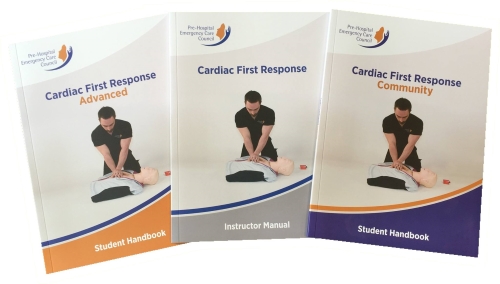Cardiac First Response (CFR) Newly Revised Standards and Training Products
The Cardiac First Response (CFR) Community, Advanced and Instructor Courses serve as the foundation level for the nine higher level PHECC Education and Training Standards. The numbers of individuals trained to provide CFR and those instructed to train has continued to grow since PHECC introduced the standards in 2006.
|
|
CFR Community
|
18713
|
CFR Advanced
|
2662
|
| CFR Community On-line |
596 |
| CFR Community Instructor |
806 |
| CFR Advanced Instructor |
147 |
Background
This past July PHECC completed a project to review and update our CFR material to incorporate the
2015 International Liaison Committee on Resuscitation (ILCOR) Guidelines (see below about ILCOR).
The revision of our
CFR Education and Training Standards for Community and
Advanced Courses and the
Clinical Practice Guidelines (CPGs) for CFR level was the cornerstone for the CFR project.
Ray Carney, an Advanced Paramedic, managed the eight-month project with oversight from the Education and Standards Committee.
Project Milestones
Project activities included:
• reviewing current literature on resuscitation science and associated topics
• writing an instructor manual and the student manuals – CFR Community and CFR Advanced
• designing and producing a two-hour instructional video to accompany the manuals
• drafting new student assessment sheets
• creating new multiple choice question (MCQ) exam for CFR Advanced course participants
• updating the online CFR instructor programme and detailing the changes with the new CFR course
• pilot testing of the new courses with learners
• developing a sample AED checklist
• designing supplementary material including CFR posters and bookmark.
Throughout the project timespan we involved a wide range of instructors, practitioners and responders from all sectors of our recognised institutions (RIs) and other stakeholders such as the CFR responder groups, Irish Heart Foundation and Occupational First Aid Assessment Agency. They took part in several focus groups, reviewing chapter scripts for the manuals, critiquing elements and some individuals participated in the filming of the instruction video. Their expertise and experience helped to ensure the new suite of training products meets the needs of our RIs in providing high quality CFR education.
In association with the revision of the CFR materials PHECC has also introduced a
new CFR Report for responders to complete in their provision of care.
CFR Communications
Early August marked the start of dissemination for our revised CFR material to our 42 RIs and CFR instructors providing CFR Community, CFR Advanced and Instructor Courses. The instructor pack (available to order and purchase from our
website) includes the following:
• CFR video
o USB format
o DVD format
• Instructor manual encompassing both Community and Advanced courses
• CFR – Community student handbook
• CFR – Advanced student handbook
• CFR posters (A3 and A5 sizes)
• Bookmark
• Request Emergency Dispatch (RED) cards.
PHECC has kept the purchase of these materials affordable to RIs and instructors as there has been no increase in the cost from our 2011 product line.
The CFR Community on-line e-learning programme available over the past few years has been withdrawn, effective August 2016. Any person seeking CFR training is required to attend the onsite learning provided by one of our RIs. See our website for
current RIs approved by PHECC to deliver the CFR and CFR instructor courses.
We have set the date of
Friday 30th September 2016, for all RIs and their instructors, for the implementation of the revised Education and Training Standards (2016) and the associated instructor and student materials. All CFR Instructors must complete the
online course instructor update before delivering any CFR courses.
In the coming months PHECC will be engaging with our RIs and other stakeholders to learn what they think of our new CFR standards, associated CPGs and accompanying education material. We want to know how they are being introduced and implemented in practice to make certain the high standards for CFR are being maintained in the pre-hospital emergency care environment.
We would like to thank all the individuals and organisations who contributed to the CFR project, most especially to Ray Carney as Project Lead.
Please check our website regularly for any updates and new information about CFR.

ILCOR was founded in 1992 as a forum between major resuscitation groups worldwide. Members include:
• European Resuscitation Council
• American Heart Association
• Heart and Stroke Foundation of Canada
• Inter-American Heart Foundation
• Australian and New Zealand Committee on Resuscitation
• Resuscitation Councils of South Africa
• Resuscitation Council of Asia
ILCOR objectives encompass:
• Providing a forum for debate and coordination of all aspects of cardiopulmonary and cerebral resuscitation globally
• Promoting scientific research in areas of resuscitation if there is a lack of data or controversy exists
• Circulating information on training and education in resuscitation
• Providing a means for collecting, reviewing and sharing international scientific resuscitation data
• Producing statements on specific issues relating to resuscitation that reflect international agreement
In 2000 ILCOR agreed and published the first International CPR Guidelines and an International Consensus on CPR and ECC Science with Treatment Recommendations. Since then it has regularly (2005, 2010) directed an evidence-based review on this subject, with 2015 the most recent review.